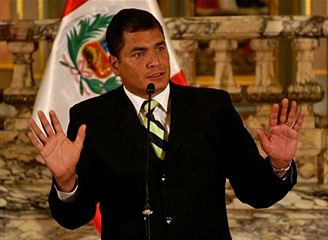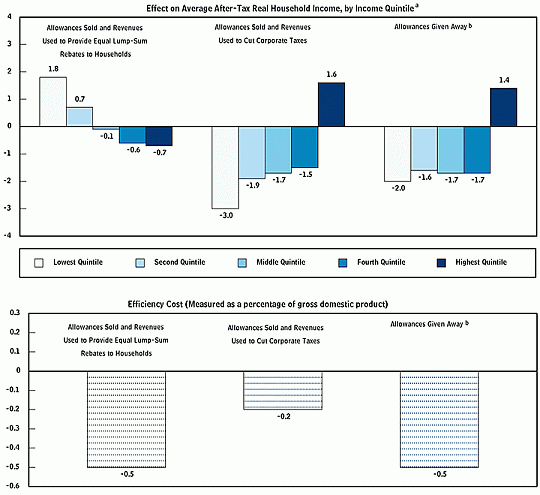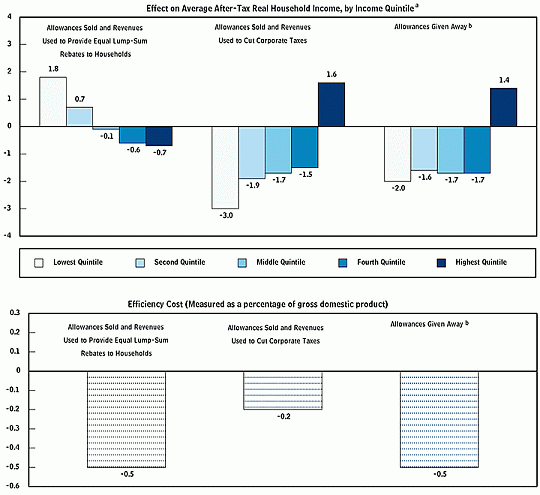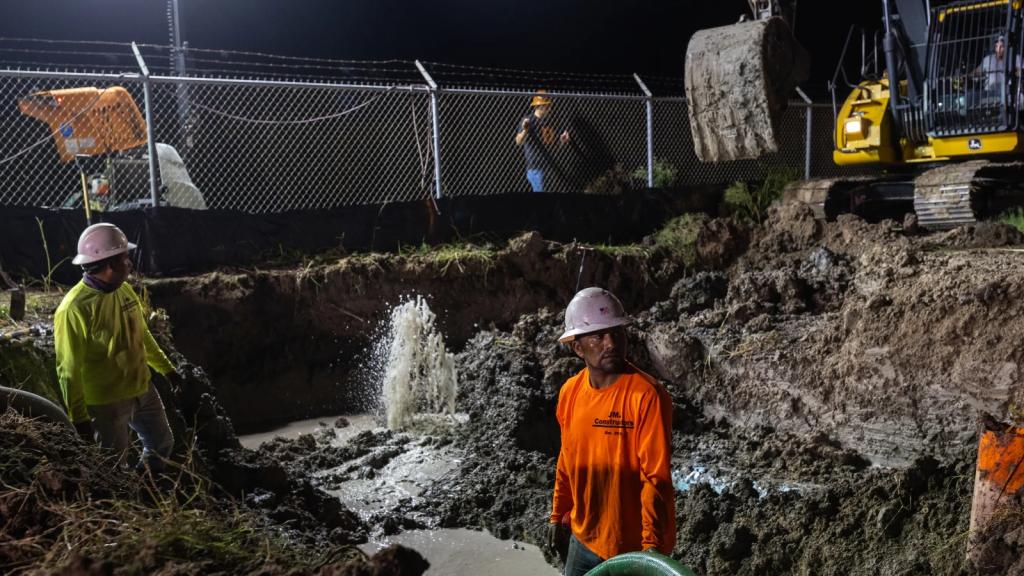
Ecuadorian President Rafael Correa
Last Monday, environmentalists were shocked to learn that the Ecuadorian government had shut down Acción Ecológica (Environmental Action), withdrawing the legal status of one of South America’s best-known environmental groups. Acción Ecológica has in recent months supported indigenous-led, mass protests and highway blockades against President Rafael Correa’s support for large-scale mining.
Ecuador possesses a fantastic ecological and cultural diversity, from coastal dry forests and mangroves, to Andean wetlands, to a breathtaking corner of the Amazon rainforest. Ecuador’s environmental movement, sustained by an alliance between the country’s indigenous and peasant organizations and urban environmental groups, is one of Latin America’s strongest, making Ecuador’s Left one of the region’s greenest.
Health Minister Caroline Chang initially claimed that Acción Ecológica failed to undertake the work specified by the NGO’s charter. But as a public outcry arose in Ecuador and criticism poured in from civil society organizations around the world, including Amnesty International, Chang changed tack, saying that it was simply a matter of needing to move Acción Ecológica’s registration to the Ministry of the Environment, a body that did not exist at the time of Acción Ecológica’s founding. In a press release, the Health Ministry said, “the suspension of the environmentalist NGO Acción Ecológica has nothing to do with persecuting this organization.”
Yet Acción Ecológica now has no legal status with which to operate and was not warned in advance of the ministry’s action, making it hard for most activists to believe that the move was merely an attempt at streamlining government administration.
Acción Ecológica leader Ivonne Ramos released a statement calling the government’s action arbitrary. “If the elimination of our legal status is a retaliation against our organization’s opposition to government policies such as large-scale mining and the expansion of the oil frontier, it would set a precedent for authoritarianism that is intolerable in a democratic regime,” she wrote.
Organizations in North America have helped to publicize Acción Ecológica’s predicament, including Canada-based Mining Watch, San Francisco-based Amazon Watch, and the Ecuador Solidarity Network (with whom this writer volunteers his time).
Rafael Correa’s 2006 presidential campaign called for a crackdown on tax evasion by the wealthy, better funding for social services like health care and education, and a foreign policy more independent of U.S. power. Correa also spoke in favor of environmental rights, and received the backing of many Ecuadorian environmentalists and the country’s powerful indigenous confederation. But disagreement over large-scale mining, and the concessions awarded largely to Canadian mining companies, has created a growing rift between the president and the country’s grassroots movements.
In January, indigenous-led street blockades protesting a new mining law shut down highways throughout the country.
In a Thursday interview with Quito’s El Comercio, former Minister of Mines and Energy Alberto Acosta called the government’s move “a form of violence.” He said, “If Acción Ecológica had committed an error, there should have been some mechanism for them to respond to the allegations — but not just withdrawing their legal status.” The erstwhile Correa ally has long worked with the country’s environmental and indigenous peoples’ movements. In July 2008, he quit as president of the assembly drafting Ecuador’s new constitution, but played a key role in ensuring that a number of green provisions were included; the establishment of legal rights for nature has drawn a fair share of international attention, protecting the earth’s “right to exist, persist, maintain and regenerate its vital cycles, structure, functions and its processes in evolution.”
Acción Ecológica has often criticized mainstream environmentalism, arguing in favor of ecologismo popular, similar to what people in the United States call environmental justice. Confronting the stereotype that environmentalism is only espoused by the comfortable and middle class, Acción Ecológica works closely with communities affected by industrial shrimping, logging, mining, and oil exploitation, forming a particularly strong bond with the Confederation of Indigenous Nationalities of Ecuador (CONAIE), one of Latin America’s most powerful movements.
Since its founding 20 years ago, Acción Ecológica has played a lead role in defending Ecuador’s Amazon rainforest against oil exploitation, logging, and mining. Since the 1990s, they have supported the landmark, multi-billion dollar lawsuit against Texaco, accusing the oil giant of polluting the rainforest’s land and water and sickening the indigenous people and peasant farmers who live there. But opposition to large-scale mining, built upon decades of experience with oil exploitation, has increasingly defined Ecuadorian politics. Movements now pose the novel question of whether, in a poor country like Ecuador, natural resource exploitation is truly the only path to development.
—–
Naomi Klein, award-winning journalist and author of The Shock Doctrine: The Rise of Disaster Capitalism, wrote the following open letter to Ecuadorian President Rafael Correa about the Acción Ecológica shutdown. Klein visited Ecuador in May 2008.
March 12, 2009
Dear President Correa,
As you may know, last May I had a wonderful visit to Ecuador during which I witnessed firsthand many of the bold and innovative measures your government is taking to deepen national democracy and advance the goal of economic and ecological justice. In my book The Shock Doctrine: The Rise of Disaster Capitalism, I write with great admiration about how you have stood up to U.S. imperialism in multiple ways, from exposing World Bank extortion to the closure of the base at Manta.
So it was with genuine shock and confusion that I learned of the Health Ministry’s move to close down Acción Ecológica by withdrawing its legal status. I have been following Acción Ecológica’s groundbreaking (or should I say “ground protecting”) work for years. When I was in Quito, it was a genuine thrill to meet several of the group’s leaders in person and I was very proud to share a platform with the incomparable Esperanza Martinez at the official launch of the Ecuadorian edition of my book.
In my research and public speaking, I have been very fortunate to travel widely, meeting with hundreds of activist groups around the world. Yet I have never seen an environmental organization like Acción Ecológica. Too often the environmental movement is part of a professional class of NGOs, more interested in nature than in people. What impressed me so much about Acción Ecológica was the fact that it is so clearly part of a genuine people’s movement, working in direct solidarity with the communities affected by the extractive industries. It is also on the absolute vanguard of what will surely prove to be the most important intellectual movement of our time: the one seeking to protect the “rights of nature” and to fund that project by requiring the wealthy polluting nations to pay our “ecological debts.” Related to this, I was excited to learn recently that you had signed a decree to keep the Yasuni-ITT oil in the ground (at least for now).
That is what makes the attacks on Acción Ecológica so disconcerting. As you well know, in nine months, the United Nations Climate Change Conference will take place in Copenhagen. This may be the most important gathering for the future of our planet, a chance to put global warming back on the international agenda (after being pushed off by the financial meltdown) and, more importantly, to resist the push from financial speculators to have a “green bubble” to replace the derivatives bubble.
There are many of us who are determined to put the issue of “ecological debt” at the very center of the debate in Copenhagen. Ecuador should naturally be at the forefront of this movement, which is why, in the lead-up to Copenhagen, activists around the world are looking to your country for inspiration.
What a shame it is that instead of seeing what I saw — a progressive government working with grassroots and indigenous movements to find solutions that reconcile economic justice with ecological imperatives and indigenous rights — these activists are instead seeing something all too familiar: a state seemingly using its power to weaken dissent. In this crucial time, we need Acción Ecológica more than ever, and we need it to be as strong and stable as possible.
Mr. President, I fully realize how difficult it is for an outsider to understand the complex internal forces shaping actions in another country. I may very well have misconstrued your government’s intentions, and if so, I am genuinely sorry. Still, I thought you would want to know how this action is being perceived by many outside Ecuador who are anxious to work with you in the run up to Copenhagen.
With great respect,
Naomi Klein




